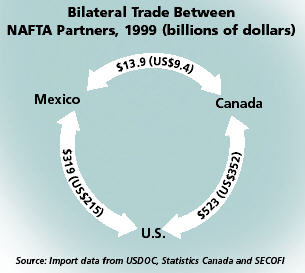
FREE TRADE DEBATE –AGAINST
Loss of Jobs
Some academics claim that the losses of U.S. jobs as a result of NAFTA are mostly sensationalist media reports without statistical credibility. Where is the evidence?
Was there a swishing sound of jobs going south of the border (as Perott warned) after Clinton signed the NAFTA into being in 1992?
Imports are cheaper and higher quality
At issue is whether or not evidence exists to determine if most imports have lower costs and better quality than products of domestic origin. For products from China, it appears unlikely.
One party trade benefits
Trade often hurts one of the parties in the transaction, but not usually discovered until after a transaction has taken place. Any examples of poor trade deals? What about the additional tariffs imposed at will by the US against Canada or Mexico?
Rural to Urban Migrations in China
Is China really coping with migration rates in excess of 100 million each year from rural areas to urban centres? Is Chinese infrastructural planning providing due processes in laws, universal education, equality for women, human rights, private property, or science as the engines of growth?
Does any evidence other than anecdotal conjecture posit that free trade actually helps develop due processes in laws, universal education, equality for women, human rights, private property, or science as the engines of growth?
Anti-Free Trade Labelism
To be anti-free trade is to be opposed to the use of child labour by multinational corporations, the use of genetically modified seeds, and the destruction of the rainforests…but is that all/are these the only reasons for opposition?
Relevance of the Silent Majority
Can either side of this debate actually address the issues of the silent majority?
Slowing Rates of Illegal Migrants
Has Mexican migration actually slowed due to NAFTA? Evidence suggests that border patrol budgets increased dramatically, smuggling charges increased, and due to increases migrants remain in the U.S. longer.
Bibliography
Bernard, E. (1995), ‘Free Trade or Free Corporations?’, in McPhail, B.M. (Ed.), NAFTA NOW! , University Press of America, pp. 65-76.
Druhe, V. (1995), ‘A View of NAFTA’s Problems’, in McPhail, B.M. (Ed.), NAFTA NOW! , University Press of America, pp.17-22.
Gereffi, G., Spener, D., and Bair J. (2002), ‘NAFTA and Uneven Development in the North American Apparel Industry’, in Gereffi, Spener, and Bair (Eds.), Free Trade and Uneven Development: The North American Apparel Industry After NAFTA, Temple University Press, pp. 327-340.
Irwin, D. A. (2002), Free Trade Under Fire, Princeton University Press.
Irwin, D.A. (2000), ‘The two faces of globalization’, Critical Review, vol. 14, iss. 1, pp. 11-19. http://80-proquest.umi.com.ezproxy.uow.edu.au [Accessed, 26 September, 2004]
Keay, I. (2003), ‘An empty promise: Average cost savings and scale economies among Canadian and American manufacturers, 1910-1988’, Southern Economic Journal, vol. 70, iss. 2, pp. 374-385. http://80-proquest.umi.com.ezproxy.uow.edu.au [Accessed, 26 September, 2004]
Pollan, M. (2004), ‘A flood of US corn rips at the heart of Mexico’s farms’, The Ecologist, vol. 34, iss. 5, pp. 6-8. http://80-proquest.umi.com.ezproxy.uow.edu.au [Accessed, 26 September, 2004]
MacArthur, J.R. (2000), The Selling of “Free Trade”, Hill and Wang, New York.
Ross, R.J.S. (2002), ‘The New Sweatshops in the United States: How New, How Real, How Many, and Why?’, in Gereffi, Spener, and Bair (Eds.), Free Trade and Uneven Development: The North American Apparel Industry After NAFTA, Temple University Press, pp. 100-122.
Marotta, G. (2004), ‘Global Economics’, Vital Speeches of the Day, vol. 70, iss. 9, pp.265-268. http://80-proquest.umi.com.ezproxy.uow.edu.au [Accessed, 26 September, 2004]
Robert, M. (2000), Negotiating NAFTA: Explaining the Outcome in Culture, Textiles, Autos, and Pharmaceuticals, University of Toronto Press.
Shahabuddin, S. (2003), ‘NAFTA: Does it have any effect on the U.S.A. economy?’, International Journal of Management, vol. 20, iss. 3, pp.306-403. http://80-proquest.umi.com.ezproxy.uow.edu.au [Accessed, 26 September, 2004]

No comments:
Post a Comment